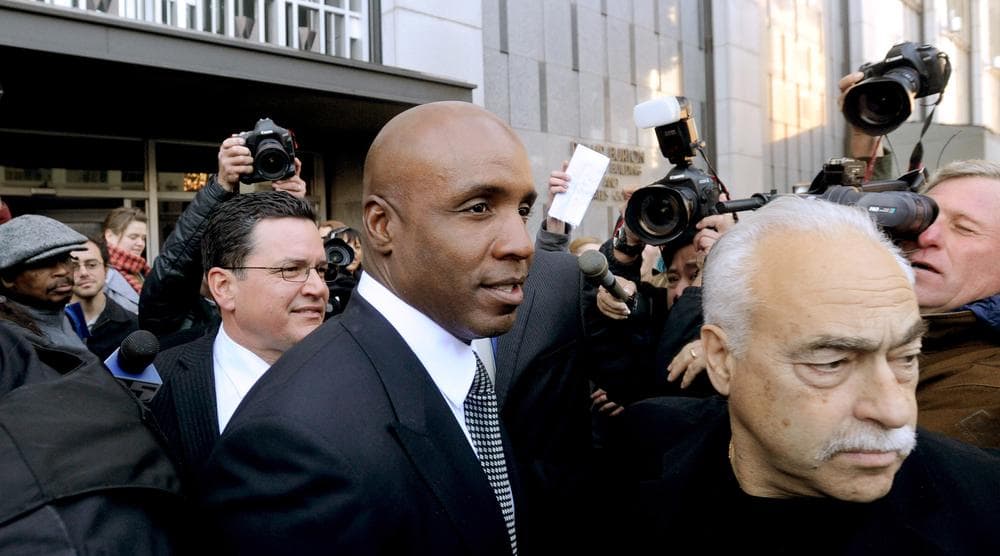Advertisement
Interview
True Stories From MLB's Steroid Era

Ask most fans about baseball and steroids, and they'll bring up Roger Clemens, Barry Bonds, Mark McGwire, Sammy Sosa or Ken Caminiti. Tom Verducci's Sports Illustrated article, "To Cheat Or Not To Cheat," focuses on lesser-known Major Leaguers who may benefited chemical assistance, and minor leaguers who didn't use performance enhancers and never made "the show."
Verducci joined Bill Littlefield on Only A Game.
The story begins with a discussion of the 1994 Fort Myers Miracle, a minor league team in Florida in which four particular pitchers are trying to reach the majors. Verducci said the focus was originally on one of those pitchers, Dan Naulty, who made the Major Leagues and eventually pitched for the 1999 World Series champion New York Yankees.
"(Naulty) not only admitted his steroid use, but really showed unprecedented empathy for other players in that he felt like he cheated those other players...out of their dream of getting to the big leagues," Verducci said. "Right away, I began to wonder, 'Who are these people?' They have names. They have stories, and they have dreams. ... To me, the real story of the steroid era is the hundreds or thousands of ball players who faced that really difficult choice at the time to cheat or not to cheat."
The three pitchers on the Miracle who didn't make the big leagues were Keith Linebarger, Brett Roberts and Kevin Legault, and Verducci said they were eager to talk.
"They are used to being called anonymous and faceless because they did not get to the major leagues, but at the same time, they thought they had a worthwhile story to tell," Verducci said.
When asked whether Linebarger, Roberts or Legault would have made the majors if the sport had been steroid-free, Verducci talked about the thin line between Triple-A and the big leagues.
"Some of it is luck, to be in the right place at the right time," he said. "All of them were close enough to the big leagues — literally one phone call away. It's certainly not outside of the realm of possibility that these guys could've made it to the major leagues, if only for a day."
Naulty admitted to taking steroids, and the advantages that he gained were clear. Verducci reported that Naulty started out weighing 180 pounds and topping out at 87 miles per hour on the radar gun. Naulty grew to 248 pounds, with most of the added weight being muscle, and gained 10 miles an hour on his fastball.
Advertisement
But with that came other things. Verducci wrote that Naulty eventually lost interest in baseball and even in living. He considered suicide several times and thought about jumping off a bridge shortly after he and his Yankees teammateswon the World Series in 1999. Was there a connection to Naulty's steroid use and his suicidal thoughts?
"It's somewhat indirect in that he had very misplaced priorities, in his opinion," Verducci said. "He was playing baseball only because he had nothing else in his life. He'd devoted all his energy and resources to becoming a major league player. When he won a World Series, he found a complete emptiness to that. I think the steroids were part of someone completely selling out their character and investing wholly in something he didn't love."
When one of the investigators working for the Mitchell Commission called Naulty in 2007, Naulty said he'd be happy to talk about his steroid use. Most players whose names appeared in the Mitchell Report were not so forthcoming, but Naulty had undergone a personal transformation in his time away from the game and had become a pastor.
"He devoted himself to the Christian lifestyle as much as he had to the major league lifestyle," Verducci said adding that Naulty felt he needed to be transparent about his mistakes. "On one of the [Mitchell Commission's] cold calls, someone replied, 'Sure. I'll tell you whatever you want to know. I'm glad to talk about my steroid use.' I'm sure the lawyer did a double take after getting that response."
For minor league players, the temptation to take something illegal to make a big-league roster will always be there, even with measures in place to deter steroid use.
"Clearly, now we have speed limits on the highway," Verducci said. "Chances are you will get caught if you exceed it, but again, we're talking about a job in which the odds are tremendously against the people who are chasing the dream. Of the players drafted, 90 percent of them will never make it to the majors for even a day....the competition is tremendous, and guys will try to get an edge anyway they can."
This segment aired on June 2, 2012.